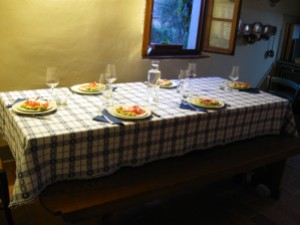
I recently returned from a trip to Italy and I observed firsthand how motivation, passion, and work can intertwine to make something beautiful. I had the pleasure of staying at an Agriturismo or working farm in the Tuscany area. Two out of the three nights we stayed, we participated in a home cooked meal which included ingredients from the Agriturismo as well as other farms within a 50 miles radius. In addition, we enjoyed the wine that they produced and sold.
Throughout the evening we were able to sample a variety of different wines, some were currently on the market while others were deemed experiments. I enjoyed listening to the winemaker describe where the grapes were grown, what the climate was for a particular year and how it affected the grapes. But my favorite moment was when he shared one of his experiments with us and I commented that I really liked it. His face shown like the brightest light with his smile and he spun around and jumped up and down like a kid trying to dance an Irish jig. I thought to myself, wow, that is it, the physical manifestation of passion.
I thought this was a unique opportunity to look at how the four drive model was working within the Tuscan kitchen. The following is based on my experience and perceptions of witnessing a passionate winemaker share his love for a product that is clearly more to him than just a product, it is a part of him and everyone that had a hand in creating the wine. Below I utilized the four drives, Acquire and Achieve, Bond and Belong, Challenge and Comprehend, and Defend and Define to bring to life the motivational drives to produce a wine that has soul and strength.
Acquire and Achieve: The winemaker had an ambition to sell good quality wine that was a standout in the region. One of the ways of achieving this was to experiment and take chances in order to make that dream happen. Selling the wine allowed him to acquire the things he wanted, selling the best good quality wine, allowed him to achieve a sense of accomplishment and prestige.
Bond and Belong: The winemaker would tell us stories of the workers on the ‘farm’ aka winery and how they all worked together to produce this amazing product that he was so proud of sharing with us. I could tell by how he described the process and the grapes that it was a team effort. The relationships and camaraderie were as important for him in producing the wine as the grapes.
Challenge and Comprehend: Creating the perfect wine for the market is a constant challenge and learning process. When to harvest, which grapes to grow, how will the grapes interact, is a part of creating the right wine. How do you know when to play a hunch, with an idea for a different kind of wine? The winemaker loved finding out if his ‘hunch’ was right on his experiments during our dinners at the Agriturismo. He was learning and listening to his customers and then he will apply that knowledge to produce a great wine.
Defend and Define: The area the winemaker grew grapes in is the Vernaccia di San Gimignano DOCG a very proud and distinguished region for growing grapes. The importance of having the certification for the DOCG (Denominazione di Origine Controllata e Garantita) means the grapes are produced in a specific region under defined quality standards. This is a great source of pride and being a part of a larger Vernaccia grape growing community is important to the quality of the product and to the pride of the winemaker, so defend the grape!
As I reflect on the dining experiences with our wonderful hosts I see how the four drive model of motivation was living and breathing in the Tuscan kitchen for our wonderful winemaker. It may seem like an odd place to find the four drive model but why not? When working with different models sometimes they are hard to bring to life from a concept to every day practicality. It is in working with them, applying them to situations that the model can come to life and show its power and strength. Just like a winemaker needs to tend to the grapes, the four drive model needs to be worked with to bring it to life and not just words on paper.
Susan Stone



Start a conversation! What do you think of these insights?